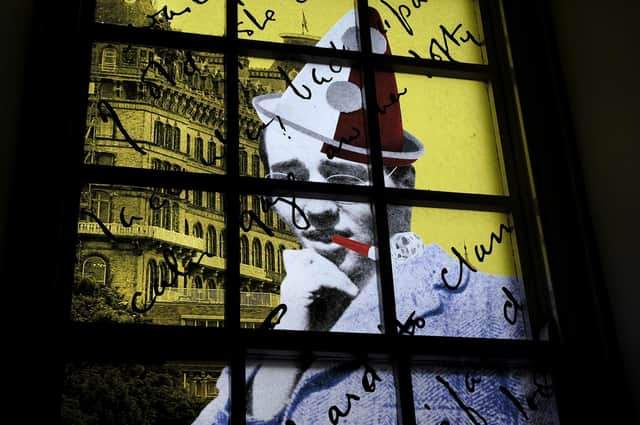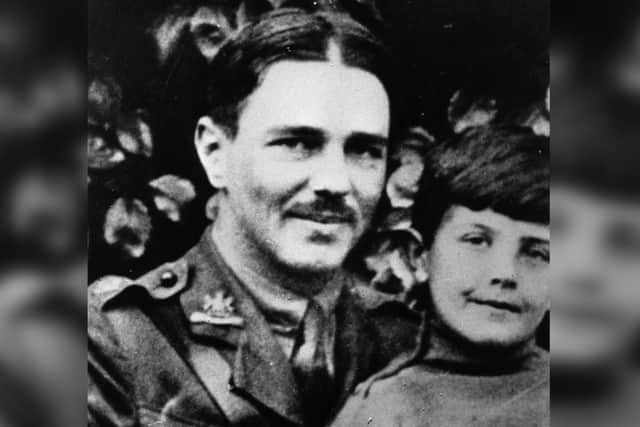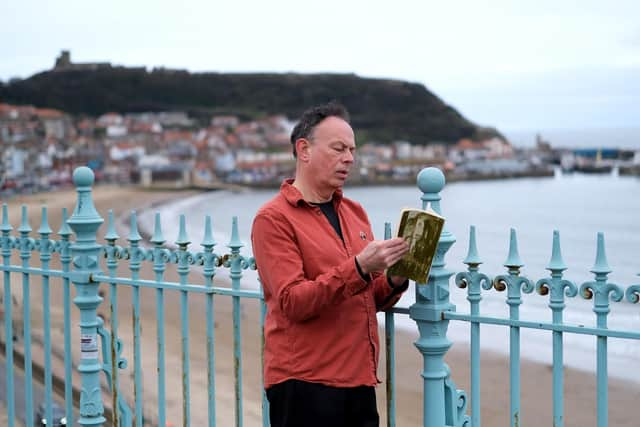Take a walk Paul Elsam to discover what poet Wilfred Owen got up to during his time in Scarborough - it may surprise you


Adding to the tragic nature of his short life and death is the fact his family in Shropshire reportedly received news of his death as church bells rang out on November 11, 1918, signalling the end of hostilities.
What is, perhaps, less well known is that Owen was a party animal who, during his time in Scarborough, enjoyed drunken nights out with friends, going to the theatre, and dining out on champagne and oysters at, among other places, the Crown Hotel.
Advertisement
Hide AdAdvertisement
Hide AdIt is both sides of the writer’s personality that Paul Elsam wants to celebrate and commemorate on the self-guided Wilfred Owen 90-minute walking tour of the town he has devised.


That is why he has included two stained glass windows, which Paul helped design, at Scarborough Railway Station in his tour. “This is an example of the two visions of Owen, side by side,” said Paul.
"One window shows the serious soldier-poet side to Owen, the other picture in which he is wearing a party hat and has a party popper in his mouth is the other Owen. He was having fun in Scarborough,” he said.
Paul, who has also written a walking tour around Anne Bronte’s association with Scarborough, is an actor, drama teacher and university lecturer. He wrote the drama degree course for Coventry University.
Advertisement
Hide AdAdvertisement
Hide Ad"With Owen, I thought there is an untold story here and I wanted to be the first to tell it.”


Wilfred Owen spent two spells of three months each in Scarborough. He was first sent to Scarborough after being treated for trauma at Craiglockhart War Hospital in Edinburgh where he also met fellow poet and soldier Siegfried Sassoon.
Owen arrived in Scarborough in November 1917 and was put in charge of the Clifton Hotel, on the north side, which had been requisitioned for officers. He left in February/March for Ripon to prepare to return to the Front.
On his return to the resort he was billeted at Burniston Barracks before returning to France and the horror of battle and the trenches he captured in his poetry – among the best-known are Anthem For Doomed Youth, Mental Cases and Dulce et Decorum Est.
Advertisement
Hide AdAdvertisement
Hide AdPaul’s walking tour includes the places most associated with Owen. It takes the walker from the Stephen Joseph Theatre, where the tour can be picked up from the box office, to The Crescent, Pavilion Square, the railway station, along Westborough through Bar Street to the cliff lift, down to the South Bay seafront with views across to the Spa and up to the Crown in Esplanade.
It then directs you to West Pier and to the Old Town – St Mary’s Church and Paradise – and then along to the Clifton Hotel.
Owen’s association with the Clifton is well known. He ran the hotel for the officers and lived in the top turret, and wrote poetry. There is a blue plaque on the hotel’s wall commemorating his stay.
"The first surprise for me was finding out he wrote some of his best-known poems here,” said Paul, “including Strange Meeting and Futility.”
Advertisement
Hide AdAdvertisement
Hide AdOwen knew Scarborough before he was stationed here and already had an affection for the area. He came on holiday with his family – his father was a railway station master and they would have got free travel – staying on the north side, playing cricket and enjoying pony rides on the beach.
His Aunt May also lived in Pavilion Square and Paul reckons Owen and his eccentric relative would have partied together.
"Wilfred’s mum Susan was very religious, anti-smoking, anti-drinking … his Aunt May was a force of nature, an entrepreneur, a risk taker, a drinker and loved theatre, something else his mum did not like.”
May ran a girls’ school in Pavilion Square and it is likely that she and Owen spent time together going to the theatre and, among other things, frequenting an oyster bar in Bar Street.
Advertisement
Hide AdAdvertisement
Hide Ad"He also wrote a poem for her called The Schoolmistress and I love the idea of Wilfred presenting it to her while they sat in an oyster bar.”
The station is on the tour because it is where Owen arrived in the town and the Old Vic, from where he wrote a letter, can be seen.
Woodend in The Crescent is where a sculpture of Owen is on display with other artefacts and it was damaged during the Bombardment. It was also the home of the aristocratic Sitwell family. Both Osbert and Edith championed Owen’s poetry before and after he died.
During his narration of the tour, Paul quotes from Owen’s letters and poetry including a letter written to Osbert about submitting a poem for Osbert’s magazine Wheels.
Advertisement
Hide AdAdvertisement
Hide AdThe Old Town was special to Owen. In a letter, he describes a night out with friend Belgian Impressionist Emile Claus. It read “… Scarborough, where there’s not a house built since 1780, not a street wider than Klaus and miles of, mind you, miles of glorious 18th century.”
He also wrote a poem – The Roads Also – about the Old Town. It starts: “The roads also have their wistful rest, When the weathercocks perch still and roost, And the town is a candle-lit room, The streets also dream their dream.”
Paul said: "Wilfred spent long periods in Scarborough during the last year of his life. It was incredibly important to him as a person because he found real joy here.
"And as a writer because he did so much of his great work here. He was also making plans for after the war. He did antique hunting in Scarborough and shipped his finds back to his family in Shrewsbury to store for him. The idea was he would after the war get his poet’s cottage.
Advertisement
Hide AdAdvertisement
Hide Ad"In a letter to his mum, he wrote he was going to ‘roam Europe looking for antiques’.”
Among Owen’s possessions found after his death was a book of Swinburne’s poetry and in the book a postcard of a painting of St Mary’s Church with Paradise in the foreground.
“That is a clarification of how much Scarborough mattered to him,” said Paul. “Even to his death, fighting in France, he had a postcard of Scarborough in his tunic. My romantic notion is that Wilfred thought to himself ‘I hope I don’t get killed but if I do I know I am already close to Paradise’.”
You can pick up a map and the audio tour at the Stephen Joseph Theatre box office. Paul is making plans to offer in-person Wilfred Owen Walks. To learn more, email him at [email protected]